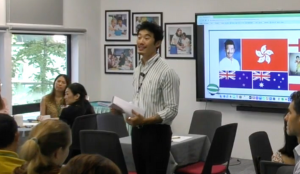In a world where cultural diversity is celebrated and embraced, the concept of third-culture kids (TCKs) has gained significant attention. These individuals, like our educator and linguistic expert Canny Wija, navigate the complexities of multiple cultures, often straddling the line between their heritage and the culture in which they are raised. As parents, it is crucial for us to understand the unique challenges our TCK children face and how we can foster open, honest dialogues to resolve conflicts and promote growth.
Understanding the Role of Courageous Conversations
Courageous conversations are not just about addressing conflicts; they are about embracing vulnerability, speaking truthfully, and fostering a sense of courage in both ourselves and our children. These conversations provide a platform for transformation, allowing us to navigate conflicts with empathy and understanding.
Building Connections with Our Children
As parents, creating a safe space for our children to express themselves openly is essential. Engaging in courageous conversations can bridge the gap between generations, cultures, and perspectives. This connection allows for deeper understanding and paves the way for conflict resolution.
Seek Conflict Transformation over Conflict Resolution
Conflict is a natural part of any relationship, it is also critical. Not all conflict can be resolved neatly and how we approach and resolve it can make all the difference. We can navigate conflicts with grace and empathy by embracing vulnerability and speaking our truth with courage. Through these courageous conversations, we can find transformation and growth as individuals and as a family.
The Power of Vulnerability, Truth, and Shame

Vulnerability sounds like truth and feels like courage. The workshop led by Canny Wija focused on embracing these qualities to navigate conflicts effectively. While truth and courage may not always be comfortable, they are essential for fostering understanding, empathy, and growth within our families. Shame is a complex and profound emotion that goes beyond surface-level feelings of embarrassment or humiliation. Shame makes us feel powerless. Children are particularly vulnerable to feelings of shame as they are in the critical developmental stages of forming their self-concept and self-worth.
We have to think about times when our children have felt shame. It is often described as a full-contact emotion due to its deep impact on an individual's sense of self-worth and identity. Unlike fleeting emotions, shame lingers, affecting how individuals perceive themselves fundamentally. At its core, shame leaves individuals feeling damaged, faulty, and unworthy, creating a pervasive sense of inadequacy that can be challenging to overcome.
This emotion is not just about external reactions or fleeting moments of discomfort; it is an internalised belief that one is inherently flawed or inferior. Shame can manifest in various ways, leading individuals to hide aspects of themselves, fear judgement, or struggle with self-acceptance. It can be a driving force behind perfectionism, overachievement, or a persistent feeling of not being good enough despite external accomplishments.
Moreover, shame is a silent force that underpins other emotions like sadness and anger. It can shape how individuals interact with the world, influencing their behaviours, relationships, and mental well-being. The pervasive nature of shame makes it a challenging emotion to address, requiring deep introspection, self-compassion, and often therapeutic intervention to unravel its grip on one's life.
In essence, shame as a full-contact emotion profoundly impacts an individual's self-perception, relationships, and overall quality of life. Understanding and addressing shame involves delving into the core beliefs and narratives that fuel this emotion, allowing individuals to cultivate self-compassion, self-acceptance, and a healthier sense of self-worth.
Embracing Growth Through Uncomfortable Conversations
Courageous conversations challenge us to step out of our comfort zones and embrace discomfort in favour of growth. By engaging in these conversations with our children, we model healthy communication and create a foundation for resilience, empathy, and understanding.
Courageous conversations are a powerful tool for resolving conflicts, fostering connections, and promoting growth within our families. By embracing vulnerability, speaking our truth with courage, and navigating conflicts with empathy, we can transform challenges into opportunities for deeper understanding and connection. Let us embark on this journey of growth and transformation together, guided by the wisdom of Canny Wija and the power of courageous conversations.
To lean in and connect with our children and have genuine, courageous conversations, we have to think deeply about our own experiences and feelings of shame.
Shame, Embarrassment, Guilt, Humiliation - What’s the Difference?
Achieving emotional granularity is crucial when engaging in courageous conversations with children. Parents need to recognise and understand the unique differences in how each child expresses and experiences emotions. This awareness allows for more effective and empathetic communication.
Shame is the most intense and debilitating of these emotions. It makes us feel like we are bad or flawed as individuals, and it can lead to a deep sense of inadequacy and low self-esteem.
Guilt, on the other hand, is a more constructive emotion. It acknowledges that we have made a mistake, but it does not define our worth as individuals.
Embarrassment is a lighter and more fleeting emotion. It is often triggered by trivial social transgressions and can be a normal part of social interaction.
Humiliation is closely related to shame but has a distinct difference. It involves feeling treated unfairly or being subjected to unjustified criticism or ridicule. Humiliation can lead to anger and hatred towards the person or group, inflicting the humiliation rather than introspection and personal growth.
Research suggests that the antidote to shame is empathy, validation, and helping the child separate their self-worth from their behaviours. When adults focus on understanding the child's underlying needs and struggles rather than just the problematic actions, it communicates that the child is inherently worthy despite their mistakes. This lays the foundation for healthy self-esteem and resilience in the face of failure.
By understanding the profound impact of shame on children's developing self-concept, adults can adapt their approach to foster self-compassion, self-acceptance, and a sense of worth - even when children inevitably make mistakes or fall short of expectations. This is crucial for raising confident, emotionally healthy children.
Behaviour vs Identity
To effectively support a child during challenging moments, it is crucial to distinguish between their identity and their behaviour. Identity refers to who the child fundamentally is, while behaviour is a response to environmental factors.
Associating a child's recent actions with their core identity can result in reactive and judgmental interventions. By approaching a child's behaviour with curiosity and generous intent, we can intervene in a way that acknowledges their inherent goodness. This perspective allows us to make informed decisions and put in place the necessary skills to support them in their development.
Come From A Place of Empathy
Talking to your child with empathy is all about creating a safe space where they feel heard and understood. It is essential to engage with them in a supportive and understanding manner. Empathy creates a positive communication environment where information flows freely and there is an empathic understanding between parents and children. Empathy helps build trust between parents and children by showing concern for each other's emotions and being emotionally supportive. This supportive environment encourages open and honest communication.
The session ‘Engaging in Courageous Conversations with Your Child’, led by Canny Wija, Year 3 Teacher, as part of the Alice Smith School Parent Empowerment Programme, can be viewed on MySchoolPortal.


